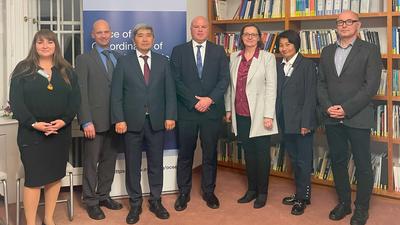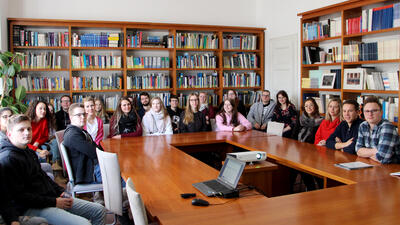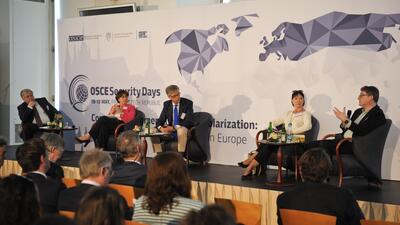-
Our work
-
Fields of work
- Arms control
- Border management
- Combating trafficking in human beings
- Conflict prevention and resolution
- Countering terrorism
- Cyber/ICT Security
- Democratization
- Economic activities
- Education
- Elections
- Environmental activities
- Gender equality
- Good governance
- Human rights
- Media freedom and development
- Migration
- National minority issues
- Policing
- Reform and co-operation in the security sector
- Roma and Sinti
- Rule of law
- Tolerance and non-discrimination
- Youth
- Field operations
- Projects
-
Meetings and conferences
- Summit meetings
- Review Conferences
- Ministerial Council meetings
- Plenary meetings of the Permanent Council
- Plenary Meetings of the Forum for Security Co-operation
- Security Review Conferences
- Annual Implementation Assessment Meetings
- Economic and Environmental Forum
- Economic and Environmental Dimension Implementation Meetings
- Human rights meetings
- Media conferences
- Cyber/ICT security conferences
- Conference of the Alliance against Trafficking in Persons
- Gender equality conferences
- Annual OSCE Mediterranean conferences
- Annual OSCE Asian conferences
- Partnerships
-
Fields of work
-
Countries
- All
-
Participating States
- Albania
- Andorra
- Armenia
- Austria
- Azerbaijan
- Belgium
- Belarus
- Bosnia and Herzegovina
- Bulgaria
- Canada
- Croatia
- Cyprus
- Czechia
- Denmark
- Estonia
- Finland
- France
- Georgia
- Germany
- Greece
- Holy See
- Hungary
- Iceland
- Ireland
- Italy
- Kazakhstan
- Kyrgyzstan
- Latvia
- Liechtenstein
- Lithuania
- Luxembourg
- Malta
- Moldova
- Monaco
- Mongolia
- Montenegro
- The Netherlands
- North Macedonia
- Norway
- Poland
- Portugal
- Romania
- Russian Federation
- San Marino
- Serbia
- Slovakia
- Slovenia
- Spain
- Sweden
- Switzerland – OSCE Chairpersonship 2026
- Tajikistan
- Türkiye
- Turkmenistan
- Ukraine
- United Kingdom
- United States of America
- Uzbekistan
- Asian Partners for Co-operation
- Mediterranean Partners for Co-operation
-
Structures and institutions
- Chairpersonship
-
Secretariat
- Secretary General
- Office of the Secretary General
- Conflict Prevention Centre
- Transnational Threats Department
- Office of the Special Representative and Co-ordinator for Combating Trafficking in Human Beings
- Office of the Co-ordinator of OSCE Economic and Environmental Activities
- Gender Issues Programme
- Opportunities for Youth
- Department of Human Resources
- Department of Management and Finance
- Office of Internal Oversight
- Documentation Centre in Prague
- Institutions
-
Field operations
- Presence in Albania
- Centre in Ashgabat
- Programme Office in Astana
- Programme Office in Bishkek
- Mission to Bosnia and Herzegovina
- Programme Office in Dushanbe
- Mission in Kosovo
- Mission to Moldova
- Mission to Montenegro
- Mission to Serbia
- Mission to Skopje
- Project Co-ordinator in Uzbekistan
- Closed field activities
- Parliamentary Assembly
- Court of Conciliation and Arbitration
- Organizational structure
- About us
OSCE Documentation Centre in Prague

The Documentation Centre in Prague holds the permanent records of the OSCE, documenting its history since the early 1970s. It is the trusted repository for the OSCE’s archives and those of its predecessor, the Conference on Security and Co-operation in Europe (CSCE).

Quick links
The OSCE’s institutional memory
The Documentation Centre in Prague preserves the permanent records of the OSCE, documenting its history since the early 1970s. As the trusted repository of the OSCE’s archives — and those of its predecessor, the CSCECSCE
Conference on Security and Co-operation in Europe (Conference on Security and Co-operation in Europe) — it serves as the custodian of the Organization’s institutional memory.
The Centre works with a wide range of stakeholders to encourage the use of its extensive records and to share knowledge on OSCE-related themes.
Its key functions include:
- Preserving and making available the CSCE/OSCE historical archives and records
- Making available and maintaining document collections of plenary meetings of the Permanent Council and Forum for Security Co-operation, as well as the document collections of FSC Military Information Exchanges
- Organizing the Researcher-in-Residence programme
- Conducting multidisciplinary outreach activities
Facilitating and providing logistics for the organization of conferences and seminars held in Prague, primarily the Concluding Meeting of the annual Economic and Environmental Forum
Archives and records
Chief repository for historical archives
The Documentation Centre in Prague is the chief repository for historical archives created by the OSCE since its foundation as the Conference on Security and Co-operation in Europe (CSCE).
The Centre holds all major CSCE/OSCE conference documents, CSCE policy records and documents from 1972 to 1994, and OSCE records from 1995 onwards, in hardcopy and digital formats, forming the basis of the Organization’s institutional memory. The primary function of the Centre is to collect, describe, preserve and make these records of permanent value available for research purposes.
Researcher-in-residence programme
Academic research on the OSCE
To promote academic research on the OSCE, the Centre organizes the OSCE Researcher-in-Residence programme.
Since 1998/1999, this programme provides students, academics and other professionals access to the CSCE’s and the OSCE’s rich archival collections and serves as a reference library of secondary sources comprising multilingual books, articles, periodicals and other materials. These publications relate to international and European relations, legislation, human and minority rights, as well as fundamental freedoms and security. In addition, researchers participating in the programme are provided with work stations that are connected to the digital collections and search tools.
Outreach
The Documentation Centre conducts an array of multidisciplinary outreach activities, including—upon request—presentations on the role and history of the Organization, as well as exhibitions and events for academics, civil society and students.
The Centre also participates in conferences relevant to its records holdings and co-operates with networks of academia and think tanks of the OSCE participating States and Partners for Co-operation. Additionally, it offers presentations to visiting groups, which comprise an introduction to the OSCE’s history, structure, activities and the Documentation Centre in Prague.
Four times a year, the Centre compiles Quarterly Selections of recently-released OSCE documents and publications and sends them to more than 16,000 subscribers.
Depository library network
A network of depository libraries in different countries supports the Centre in promoting public access to the OSCE’s public documents.
Every year, the Centre mails compilations of the main OSCE public documents on DVD-ROMs to the depository libraries and the interested public to ensure that the OSCE’s institutional memory is preserved.
OSCE depository libraries are located in the participating States and the Partners for Co-operation States.
CSCE/OSCE history projects
CSCE Testimonies: Causes and Consequences of the Helsinki Final Act 1972–1989
In 2010, the Centre embarked on the CSCE/OSCE Oral History Project, which culminated in the publication of the book CSCE Testimonies: Causes and Consequences of the Helsinki Final Act 1972–1989. Available in print and online, it includes interviews with prominent officials and public figures involved in the Helsinki process, as well as all three subsequent review meetings (Belgrade, 1977–1978; Madrid, 1980–1983 and Vienna, 1986–1989). The nine testimonies presented there feature different points of view regarding the evolution and development of the CSCE from 1972 until 1989.
Paris Summit 1990 and the Charter of Paris for a New Europe
On the occasion of the 30th anniversary of the CSCE Paris Summit and the CSCE Charter of Paris for a New Europe, the Centre and the OSCE Communication and Media Relations Section prepared a commemorative web page on the Paris Summit 1990 and the Charter of Paris for a New Europe that showcased historical documents, testimonies and photographs of this historic event.






